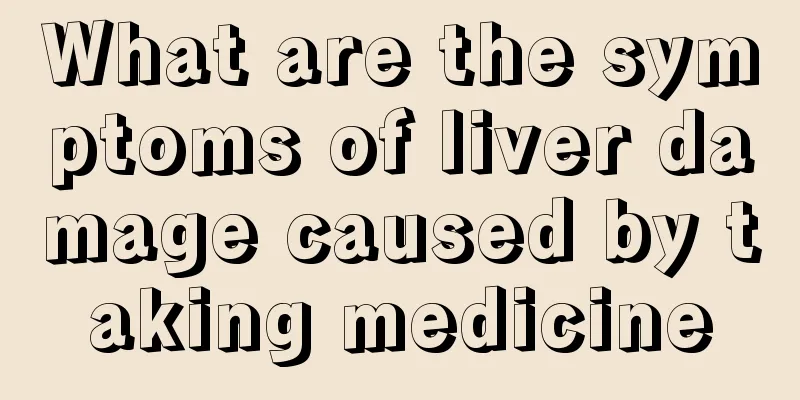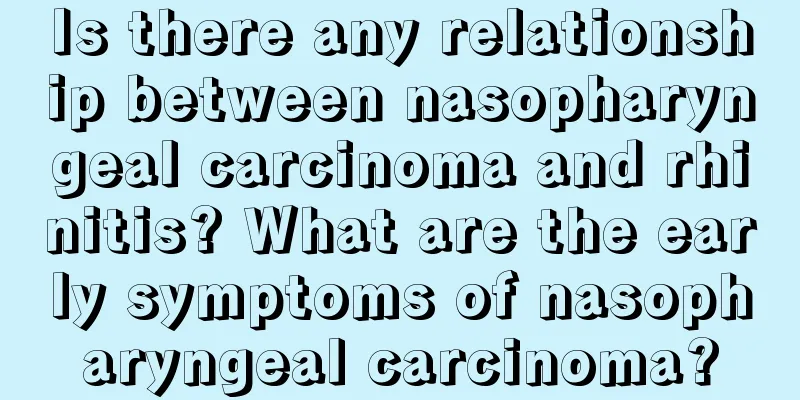What are the symptoms of liver damage caused by taking medicine

|
The liver is the largest detoxification organ in the human body, so the food we eat and some medicines will have some impact on the liver. Especially when taking some medicines, we must pay attention to the instructions and not cause harm to the liver. Drugs can cause enormous damage to the liver, and once the liver is damaged, it is irreversible. Before taking any medicine that is harmful to the liver, it is best to consult a doctor and take it under the doctor's guidance. Symptoms of liver damage caused by taking medicine Common symptoms in patients with liver damage include fatigue, nausea, vomiting, anorexia, hepatomegaly, pain in the liver area, jaundice, fever, chills, and elevated transaminase levels. Drugs that harm the liver 1. Antipyretic and analgesic drugs Such drugs as aspirin, acetaminophen, ibuprofen, indomethacin, etc. can cause toxic liver damage. If you use more than 5 grams of aspirin per day or more than 2 grams of acetaminophen per day, it can easily cause acute liver damage. 2. Antibiotics Such drugs as macrolides, tetracyclines, sulfonamides, chloramphenicol, oxacillin, nystatin, clindamycin, ketoconazole, etc. can all cause significant liver damage. If the dosage of oxacillin is too large, toxic hepatitis may occur within 5 days of use. 3. Drugs for treating digestive system diseases Such drugs as cimetidine, ranitidine and asparaginase can cause toxic liver damage. For example, cimetidine can cause a mild increase in serum aminotransferase, and occasionally severe hepatitis, liver damage, and hepatic fatty degeneration. There have been reports of acute pancreatitis caused by the use of this product in both animal experiments and clinical practice. Sudden discontinuation of the drug may result in perforation of chronic peptic ulcers. 4. Drugs for the treatment of cardiovascular disease Such drugs as methyldopa, quinidine, amiodarone, fenofibrate, statins, etc. can cause liver damage. Among them, methyldopa can damage the user's liver cells and bile ducts. A small number of patients may develop jaundice and elevated transaminase levels 1 to 3 weeks after using methyldopa, and may even develop granulomatous hyperplasia of the liver, cirrhosis, and liver necrosis. 5. Antidiabetic drugs Such drugs as gliclazide, glibenclamide, and gliquidone can damage the liver. In addition, hepatic insufficiency will change the distribution of gliclazide in the body, and hepatic insufficiency will also reduce the ability to generate new glucose; both effects will increase the risk of severe hypoglycemic reactions. 6. Sex hormones and contraceptives Such drugs, such as male hormones such as methyltestosterone and oral contraceptives such as megestrol, ethinyl estradiol, and norethindrone, can cause symptoms of liver damage such as jaundice. 7. Anti-tumor drugs Such drugs as azathioprine, methotrexate, 5-fluorouracil, 6-mercaptopurine, mitomycin, cyclophosphamide, etc. can damage the liver. Among them, the probability of jaundice in patients taking azathioprine can reach 20% to 40%; patients taking methotrexate can develop cirrhosis; and patients taking mitomycin can develop moderate to severe liver damage. 8. Antipsychotics Such drugs as chlorpromazine and trifluoperazine can damage the liver. Among patients using chlorpromazine, 1% to 4% will develop intrahepatic cholestasis within 1 to 4 weeks, and some may even suffer liver failure and die. 9. Anti-epileptic drugs Such drugs, such as phenytoin and valproate, can damage the liver. For example, liver function tests should be performed before treatment with sodium valproate and should also be performed regularly during the first 6 months of treatment, especially for high-risk patients. 10. Anti-tuberculosis drugs These drugs, such as isoniazid and rifampicin, can damage the liver. People who are allergic to isoniazid will develop severe hepatitis or even liver necrosis after using the drug for 1 to 2 months. If isoniazid and rifampicin are used together, the hepatotoxicity of these drugs will be greatly increased. 11. Chinese patent medicine Some Chinese medicines can also cause liver damage, such as bitter almonds, cassava, broad bean root, northern bean root, hairy holly, Xanthium sibiricum, big maple seed, yellow ochre, Toosendan fruit, fish gall, Radix Trichosanthis, Ophiopogon japonicus, Coptis chinensis, and Senecio chinensis. |
<<: What should I do if my hemorrhoids are hard and painful?
>>: What should I do if I have hemorrhoids and it hurts and bleeds when I poop?
Recommend
How much do you know about the causes of uneven nails?
Nails are a necessary part of everyone's body...
Help patients understand the late symptoms of cardia cancer
The symptoms of late-stage cardia cancer are more...
What should I do if there is a hard pimple on my chin
Maybe everyone thinks that a pimple on the chin w...
How to drink red wine better?
In fact, drinking red wine is now a symbol of tas...
What is grade 3 hypertension
When it comes to hypertension, everyone should be...
Mid-term treatment costs for nasopharyngeal carcinoma
Many nasopharyngeal cancer patients suffer from t...
What can I eat to relieve motion sickness and nausea?
The trouble of motion sickness, only those who ha...
The most important health care measures for gastric cancer in life
The stomach is a very important part of our body,...
Commonly used combined chemotherapy regimens for prostate cancer
Chemotherapy is a commonly used method for treati...
How to treat acne and remove scars?
Acne is a skin disease that is common among young...
What are the methods for controlling whiteflies?
Whitefly is actually the small white moth we see ...
How to prevent nasopharyngeal cancer? What should we pay attention to in diet?
Nasopharyngeal cancer has a significant impact on...
How to effectively treat cervical arteriosclerosis?
The treatment of cervical arteriosclerosis includ...
Red rash on face after fever
The phenomenon of rash on the face after a fever ...
People are not sick, they just have too many toxins
Why do people get sick? In addition to bacteria, ...









